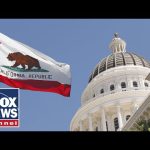This past weekend, Tesla dealerships across the United States became the epicenter of a coordinated wave of protests, as left-wing activists targeted billionaire Elon Musk over his role in the Trump administration. Demonstrators, fueled by anger at Musk’s leadership of the Department of Government Efficiency (DOGE), gathered at Tesla showrooms in over 277 locations nationwide, with some protests escalating into vandalism. The activists claim Musk’s efforts to slash government spending and streamline bureaucracy are an affront to democracy, but their actions raise serious concerns about the growing hostility in political discourse.
Musk, who has become a lightning rod for criticism due to his outspoken views and close association with President Trump, has alleged that these protests are not organic but part of a broader campaign funded by liberal mega-donors like George Soros and Reid Hoffman. According to Musk, groups such as Troublemakers, Disruption Project, and the Democratic Socialists of America, allegedly backed by ActBlue funding, are orchestrating these demonstrations to undermine Tesla and his political influence. These claims have sparked debate about the role of partisan funding in fueling unrest and targeting private businesses.
The protests have not been without consequences. Reports of vandalism at Tesla dealerships and damage to vehicles have prompted law enforcement investigations, with some incidents being labeled as domestic terrorism. Musk has decried these acts as counterproductive and harmful not only to Tesla but also to the broader goal of advancing clean energy. “Do you think sales benefit from dealerships getting firebombed? Not,” Musk remarked during a recent interview. Meanwhile, Minnesota Governor Tim Walz added fuel to the fire by mocking Tesla’s declining stock value, a move critics have called tone-deaf given his state’s pension fund investments in the company.
This campaign against Tesla highlights a troubling trend in modern politics: the weaponization of outrage against individuals and companies based on political affiliations. While Musk’s critics argue that his policies threaten democratic norms, their willingness to harass Tesla owners and employees undermines their credibility. This escalation from peaceful protest to intimidation and destruction risks alienating moderate voices who might otherwise sympathize with their concerns. It also raises questions about whether such tactics reflect genuine activism or merely partisan vendettas.
As tensions rise and the political divide deepens, leaders on all sides must condemn violence and promote constructive dialogue. Targeting businesses or individuals for their political beliefs sets a dangerous precedent that could spiral into further chaos. For now, Elon Musk remains defiant, urging Americans to focus on shared goals rather than divisive rhetoric. Whether this message resonates or falls on deaf ears will depend on whether cooler heads can prevail in an increasingly polarized landscape.




